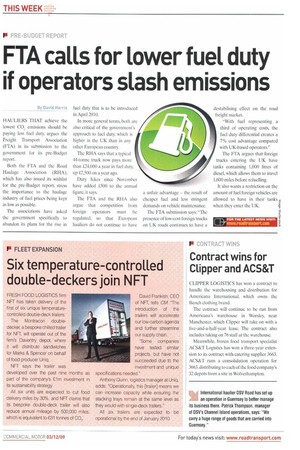P PRE-BUDGET REPORT
Page 14

If you've noticed an error in this article please click here to report it so we can fix it.
FTA calls for lower fuel duty if operators slash emissions
By David Harris HAULIERS THAT achieve the lowest CO, emissions should be paying less fuel duty, argues the Freight Transport Association (FTA) in its submission to the government for its pre-Budget report.
Both the FTA and the Road Haulage Association (RHA), which has also issued its wishlist for the pre-Budget report, stress the importance to the haulage industry of fuel prices being kept as low as possible.
The associations have asked the government specifically to abandon its plans for the rise in fuel duty that is to be introduced in April 2010.
In more general terms, both arc also critical of the government's approach to fuel duty, which is higher in the UK than in any other European country.
The RHA says that a typical 44-tonne truck now pays more than L24,000 a year in fuel duty, up £2,500 on a year ago.
Duty hikes since November have added £500 to the annual figure, it says.
The FTA and the RHA also argue that competition from foreign operators must be regulated, so that European hauliers do not continue to have a unfair advantage — the result of cheaper fuel and less stringent demands on vehicle maintenance.
The FTA submission says: "The presence of low-cost foreign trucks on UK roads continues to have a destabilising effect on the road freight market.
"With fuel representing a third of operating costs, the fuel duty differential creates a 7% cost advantage compared with UK-based operators.The ETA argues that foreign trucks entering the UK have tanks containing 1,000 litres of diesel, which allows them to travel 1,600 miles before refuelling.
It also wants a restriction on the amount of fuel foreign vehicles are allowed to have in their tanks2— when they enter the UK.














































































































































